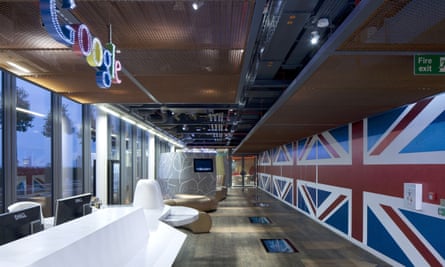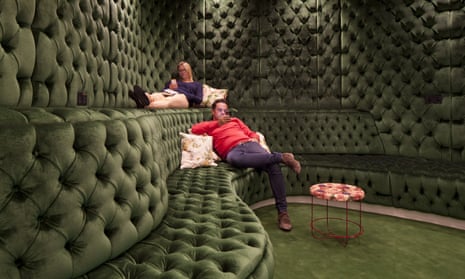Google’s decision to finally pay a one-off £130m settlement to HMRC, settling a long-running argument about its astonishingly low UK corporation tax bill, was hailed as a “major success” by the chancellor, George Osborne.
But the settlement has come under much criticism, not least as it relies on buying Google’s claim that its presence in Britain is minimal. The US tech giant says its presence is limited largely to an advertising arm and a small localisation wing, doing things such as changing $ to £ and adding in the letter “u” every time someone writes “color”.
Its sales arm doesn’t even really make money; instead, it finds customers, who are then passed over to Google’s Irish arm, with whom the actual contract is signed. This small UK operation, Google argues, isn’t enough to legally count as a “permanent establishment” in Britain for Google Inc or Google Ireland, which means it can pay corporation tax on its UK sales in Ireland, where its European arm is headquartered.

That claim is tricky to take seriously if you’ve stuck your head inside one of the company’s three large offices in London. It’s harder still if you’ve seen their plans for one building to unify them all: a cavernous “landscraper”, which would have been longer than the Shard is tall, eleven storeys high, and contain a private running track on the roof. The company ripped up the plans last year, however, after deeming them too “boring”, and brought in celebrity designer Thomas Heatherwick to come up with an alternative £1bn take.
Heatherwick is already involved in revamping Google’s offices in California, creating a “Google 2.0”, which would be “more like a workshop than an office”. Not that there was anything old-fashioned about Google 1.0, which pioneered the modern “cool” technology office, with glass walls, fun furniture, lavish canteens and an airy, affluent but geeky atmosphere.
That highly American idea of an dotcom’s office - as far away from the traditional grey cubicle farm as possible - often has no real hierarchy and a design aimed at fostering accidental meetings and idea conversations not to mention all sorts of employee lifestyle benefits. It has become a status symbol and a tool for attracting top talent, as others including Facebook, Microsoft and Twitter compete for engineers and developers.
Imported to the UK, it looks slightly different. Rather than leafy landscaped campuses, Google in London is cooped up in tall office blocks or shared buildings with traditional facades. Google has three big offices in the UK capital – two in Victoria and one in Central St Giles – as well as smaller ones housing outfits such as its artificial intelligence arm DeepMind in King’s Cross.

In its main offices the walls are still a mixture of brightly coloured glass and write-anywhere-walls, the carpets are varied funny colours, some with fur that looks like it is there to tempt workers to a little lie-down. There are faux airlock doors with turning wheels and portholes to boot. There is also a mixture of ultra-modern furniture that wouldn’t look out of place on the bridge of Star Trek’s Starship Enterprise. That butts against decadent, buttoned leather sofas.
The spaces are there to impress and draw people in, but actually present an ambience oddly halfway between a nouveau riche bachelor pad and Teletubbyland. Most of the offices have at least one fully serviced canteen, where chefs serve up better meals than you’d get in most hotels. Some have roof terraces, games rooms, chillout spaces that resemble old smoking men’s clubs and indoor gardens. Free drinks fridges are everywhere and there’s even a YouTube-branded bus in the corner of one.
They often provide quite a contrast with the other users of their shared buildings. The Central St Giles office, which sits at the top of a modern tower block also used by NBC international, is the company’s public-facing HQ. The majority of the company’s employees, however, are based in Victoria, on the other side of the West End. Outsiders get invited to the ninth floor of the Googleplex, where views over all of central London help induce sufficient awe of the 21st century’s equivalent of royalty, the kings and queens of Silicon Valley.
Victoria is where most of the actual work happens too. In its pitch to would-be Googlers, the company says that “here at Google London, our Sales teams focus on helping our customers grow their businesses throughout Europe, the Middle East and Africa. We’re also one of Google’s largest engineering operations in Europe, and the biggest office in the UK, working on Google Play, Search, AdSense and more.”

It’s less clear how can that be, if the Google’s activity in the UK is small, localised, and definitely not a “permanent establishment”? The answer is given in the company description for Google UK Limited: “The company is engaged in the provision of marketing services to Google Ireland Limited and the provision of research and development services to Google Inc.”
People in Google’s UK offices may be deeply involved in building some of its most important, and profitable, technology, but they aren’t actually building it for Google UK. Instead, they’re really working for the US arm, selling their services in exchange for a modest, low-tax, and entirely artificial profit.
At least the fully serviced canteen is stellar.

Comments (…)
Sign in or create your Guardian account to join the discussion